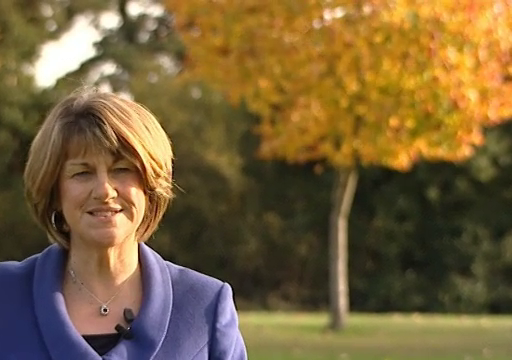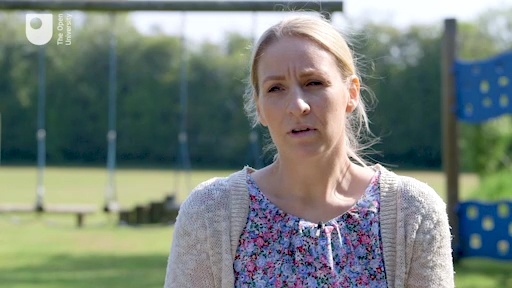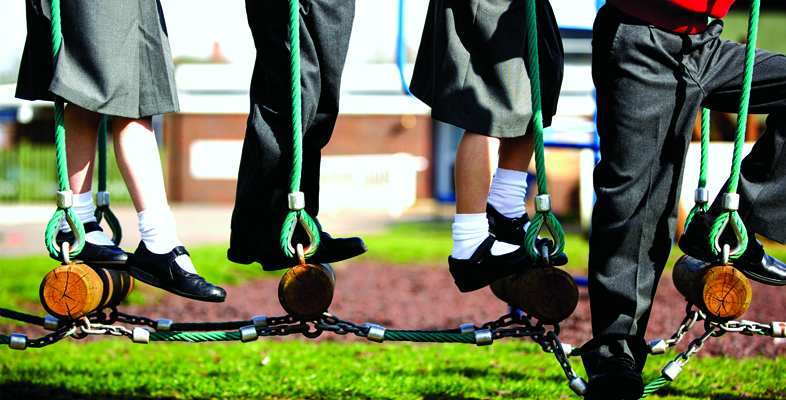2 Planning and assessing cross-curricular projects
Next you will watch a video on cross-curricular planning.
Activity 3 Observing children in cross-curricular learning
The video has several sections, so you can pause and watch at different times.
Listen to how the teachers and headteachers describe their work, and their observations of children. Are you familiar with any of the ideas they talk about, from your own experiences of school or the experiences of children you know?

Transcript: Video 3
STEPHEN SPOONER
Cross curriculum.
SARAH KENNEDY
Cross curriculum. Oh, OK.
STEPHEN SPOONER
Even the heads can't keep up to date with it.
REBECCA STANLEY
Merging together subjects to--
PETER WILKES
Joining subjects together in a cl--
CHRIS BLACKBURN
Cross curriculum, learning being creative with the curriculum, linking science and numeracy and literacy with other subjects.
KATHERINE BULTITUDE
I think it is worth assessing cross curricular work. In fact, I think it's essential.
REBECCA STANLEY
I think you have to, because the idea of cross curriculum working isn't that it's something that's not assessed or it's outside of what they should be learning. It's fundamental to what they should be learning, but you're linking things together.
SARAH KENNEDY
I think it gives you a picture as to whether a child can transfer skills throughout different subjects and not just apply them within one subject.
RICHARD DUNNE
I think when you do assess in cross curricular areas, we need to look at creative ways of doing it. So it might be making it a quiz. It might be in the skills that we're developing and observing how they're interacting with each other through those cross curricular experiences.
KATHERINE BULTITUDE
Assessing how well they're doing with those skills and what level they've achieved, not necessarily in terms of national curriculum levels, but how well they can actually put those skills into practise. I think it's essential.
RICHARD DUNNE
We might get them to step back and really evaluate their performance in something, evaluate each other's performance. That's a very effective tool. And they appreciate, if it's done in the right way, what they have to say about each other's work.
SUE SHOVELLER
Creativity is all about making new connections. And cross curricular activities are about making connections across the subjects.
SARAH KENNEDY
Can become stale if you don't sort of play about with it and mix things up.
KATHERINE BULTITUDE
Well, I think of the really good things about cross curriculum work is that it does allow you to be much more creative.
CHRIS BLACKBURN
But it can be great to be teaching geography and literacy or teaching science and maths. And you know, it kills two birds with one stone, A, and it can make maths lessons more interesting if you're talking about science.
PETER WILKES
For me, that's one of the huge benefits of cross curriculum learning. It gives you a chance to create exciting learning environments, which the children get involved in and are completely committed to.
RICHARD DUNNE
I think shared experience is core to-- an essential to good learning. And perhaps we don't do it enough.
REBECCA STANLEY
I think you can do cross curriculum work without having a trip or a speaker or whatever. But it just adds an extra dimension to it.
PETER WILKES
It completely engages them. It gets them really completely involved in the learning. And it's real for them. You know, you can't talk about seaside without going to it. And you shouldn't.
STEPHEN SPOONER
And I remember, a few years ago, on a coach, driving towards the seaside. And the girl burst into tears. And I said, well, what's wrong? She's never seen the sea before. She's never been out of her local area before.
RICHARD DUNNE
In year six, they learn about Antarctica. One of the things they do is, in winter, to stand in this playground as a penguin colony in a huddle. And the outside group move in. The inner group moves to the back. And they truly experience how they keep warm in the cold of Antarctica.
STEPHEN SPOONER
So having those shared experiences and bringing them back to school will actually develop children's thinking skills and learning skills and ideas and concepts.
PETER WILKES
And sometimes it just might be in your classroom. You know, we were doing traditional tales. And I changed my classroom into a place that the Three Bears had basically wrecked. And the children walked in and were like, oh my word. What's going on here? And then, we had to investigate it and take the story from there.
FIONA MACCORQUODALE
I mean, we turned our classroom into a rainforest. The children really enjoyed it. They were going home and finding things out about the rainforest. Their parents said they were talking to them more than they ever have about what was going on at school. So it wasn't just a shared experience with the children. It was involving the parents in their children's learning and what was going on at school
PETER WILKES
You're all starting at the same point and you're not expecting anything. There's no assumed knowledge. So they all learn from the same point.
KATHERINE BULTITUDE
I think it's always a good idea to get the children to share what they already know and have the kind of classroom culture where everything's very relaxed about giving information in front of other people.
SARAH KENNEDY
And I think as long as you're cross referencing your objectives between your discrete teaching and your cross curriculum teaching, then you're not going to miss anything. And you're giving repeated experiences for children to try things out and to consolidate their knowledge and their skills.
STEPHEN SPOONER
When I was a classroom teacher, I'd been in the classroom saying to the children, what do you know about this particular subject? And what do you want to know?
SUE SHOVELLER
You might do data handling and mathematics. You might use that knowledge in geography or in science.
FIONA MACCORQUODALE
So when you put it in a context, it makes it a lot more meaning for the children. So they actually almost sometimes don't realise they're learning something or they're doing something.
SUE SHOVELLER
So it's a using of the skills and knowledge that the children have acquired previously, taking it across and broadening it out.
FIONA MACCORQUODALE
It's got a lot more meaning. I was about to say, do you know what I mean?
SARAH KENNEDY
To be honest, I can't think of a subject that I couldn't link at some point in some way.
PETER WILKES
Everything could be linked. There's loads of links. But it's how tenuous there.
FIONA MACCORQUODALE
It is about, common sense, what goes really well together. If you're looking at the ancient Greeks, then you can look at mosaic as art.
KATHERINE BULTITUDE
I don't think there are subjects you shouldn't link together. In fact, I was trying to think. I don't think there are any subjects that you can. I think the trouble is, when you start linking subjects together for the sake of it.
SARAH KENNEDY
For example, RE, we do teach quite discreetly. But sometimes that fits in with science, for example, festivals of light.
FIONA MACCORQUODALE
So it's meaningful and natural links. Otherwise, it's kind of forcing something that doesn't fit. And it will be as confusing to the children as it is for you.
SARAH KENNEDY
Never say never.
SUE SHOVELLER
We plan our lessons in the subject areas of the national curriculum. And as we plan, we look for really strong--
[SCHOOL BELL]
SARAH KENNEDY
You start with objectives. And then, you look at what's common amongst the subjects that you have to teach.
REBECCA STANLEY
Possibly, I would start with the science plan first and then feed that into the literacy plan, rather than the other way around.
SUE SHOVELLER
We plan in subject areas. But whilst we plan, we are always looking for the links that can move across the curriculum. And we find that a more productive way of planning, because it keeps the focus very, very clear.
PETER WILKES
That's where we start from, looking at that the renewed framework. The units are great. They offer loads and loads of opportunities for cross curriculum links. So we sort of use that as a backbone.
REBECCA STANLEY
You've got the science objectives already covered. But then, you know specific knowledge you can use and feed into the literacy tasks.
SARAH KENNEDY
And you can start to look at certain topics, which might act as an umbrella for all the others. And then, you've got some sort of topic that you can slide your subjects into, inside the objectives into.
REBECCA STANLEY
Does that make sense?
RICHARD DUNNE
We try and make the topics relevant to these children here in this school.
REBECCA STANLEY
I think cross curriculum working allows children to see links across the subjects. And I think that's part of making it relevant to them. These aren't things they're learning in isolation.
SARAH KENNEDY
If you can get parents to come in and talk about their own experiences, that's also making it a little bit more relevant for the children in the class.
RICHARD DUNNE
We're very close to Hampton Court Palace. So I know Tudors is a history topic that will be taught, but it's one that we definitely need to teach in this school.
REBECCA STANLEY
We've sold our plants that we've grown in the past in an enterprise day activity. Makes it relevant then. We're not just growing plants for the sake of it, we're growing plants and understanding how to grow plants so that we can sell them. So we need to grow healthy plants. And we've become like little florists and green grocers and things.
SUE SHOVELLER
Cross curricular topics are all about children applying prior knowledge in a more open way, if you like, across a range of subjects.
PETER WILKES
We've compared in Cotgrave to see where the children live with a seaside location, which is Skegness.
SARAH KENNEDY
Great Fire of London is a great topic to web and use in amongst lots of other subjects.
RICHARD DUNNE
If we take, for example, the Tudors, we might look at Tudor dance. We might look at Tudor portraits.
PETER WILKES
And we're linking our art into it now, where we're actually making a model village of a sort of mixture of Skegness and Cotgrave.
SARAH KENNEDY
It's also something that if you ask a year six child who's been in year two, they'll always the Great Fire of London. It's one of those topics that just works.
PETER WILKES
I think the reason for doing it is to make learning more exciting and more meaningful for children.
STEPHEN SPOONER
Because children don't learn in small boxes.
SARAH KENNEDY
Sometimes when they're learning things for the sake of learning it, it becomes quite dull and it's not as relevant as it could be to them. And I think the minute you start to link things together, they start to have a more holistic view of what you're trying to teach them.
PETER WILKES
By having cross curriculum learning, it means that you are a bit more freer with your time. One of the main reasons that we've sort of looked at it is because staff were getting really frustrated with the compartmentalising subjects.
REBECCA STANLEY
Because you're pulling time cross curriculum areas, you've got longer to look at initiate than perhaps you would normally have. So I think if you sometimes get deeper learning, rather than if you dealt with all of these things separately.
FIONA MACCORQUODALE
I used to find I had piles and piles and piles of things that were started but not finished, because I did my hour long slot and some of them maybe got some of it done. But now, I spend as much time as I need to spend making sure that a task, an activity has been completed thoroughly, that the understanding is there, and that they've applied these skills effectively.
PETER WILKES
It gives teachers more freedom. It allows you to be more creative with your teaching. And for the children, they can see their learning journey.
REBECCA STANLEY
From a teacher perspective, that's what I like about cross curriculum working. What else?
RICHARD DUNNE
I don't know. What shouldn't they do? You'll have to ask the others this.
PETER WILKES
The big no-no's, for me, are being careful that we don't slip back into some sort of old fashioned type of teaching that doesn't have any rigour, doesn't have any progression, it doesn't really pay any attention to the national curriculum.
SARAH KENNEDY
I think you have to be careful that you're still achieving the objectives that you set out to achieve, because there's a danger if you're not careful with your monitoring that you either skipped some out or you overdo the same ones.
SUE SHOVELLER
I think what doesn't work is if you think of a topic, say a bus, and you're going to look at buses and then you try and link in all the areas of the curriculum to one particular area. Because that way, you're going to be trying to look for links that might be spurious or weak. And you're going to spend a lot of time trying to explain what the link is when, actually, it's not supporting the learning that you want the children to have at the end.
KATHERINE BULTITUDE
I think sometimes you can overdo it. When they come in and they are saying, oh, not the Aztecs again, then you know you've gone too far.
REBECCA STANLEY
It's probably making sure that you've got enough time rather than things going really badly.
RICHARD DUNNE
No. I honestly can't think of a time when we have done cross curriculum work and thought, oh, no. That didn't work at all.
Discussion
The teachers and headteachers in the video say that there is a world of difference between a cross-curricular project or topic that is well-planned, achieves its curriculum objectives and engages children, and unfocused topic work which, at its worst, makes forced connections between subjects that are confusing for children and adults alike.
The comments by teaching staff in the video illustrate how they observe children’s enthusiasm and enjoyment of cross-curricular topic work. The teaching staff use their observations to assess children’s learning and plan new learning experiences. But they also comment on how they use such observations to reflect on their own teaching and how much children are benefiting from it. They recognise, as one teacher says, that children don’t learn in small boxes. Cross-curricular work helps teachers to create exciting learning environments which children can get involved in.
Teacher Sarah Johnson, who you met in Session 3, says an important aspect of cross-curricular projects is that they allow teaching staff to observe and listen to children, and learn what makes them ‘tick’. She also says cross-curricular work lets children take on different ways to learn and participate.

Transcript: Video 4
Teachers also talk about the value of shared experiences in topic work, where there is no assumed knowledge, and there is an atmosphere of mutual encouragement where no one is afraid to ask questions.
In the video that you watched, a teacher says it’s a good idea to find out what children know before you begin to teach them anything. These kinds of comments show that adults in primary schools can consider themselves as learners too.
In the next section, you will look at specific aspects of creative support for children’s learning in the primary school and listen to teaching assistants talk about their work.
